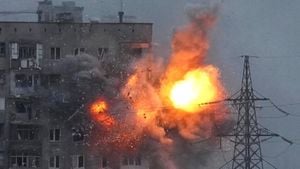Dozens were arrested on Monday, November 25, as police cracked down on demonstrators protesting against gender-based violence in Istanbul, Turkey, marking the International Day for the Elimination of Violence Against Women. This year alone, reports indicate more than 400 women have been killed, and the protests aimed to hold the government accountable for its perceived failure to protect women. Activists took to the streets to demand governmental action, including the enforcement of laws meant to provide protection for women amid widespread frustrations with rising violence and femicides.
Despite authorities issuing a ban on public gatherings, activists were determined to voice their concerns, with many gathering at Istiklal Avenue, the city’s prominent pedestrian street. Law enforcement responded by barricading entrances to popular protest areas and shutting down metro stations to prevent groups from assembling. Although the demonstrations were organized for a significant cause, the atmosphere at the protests quickly shifted, as police intervention led to the detention of various participants.
Women have increasingly expressed their dissatisfaction with the government's stance on women's rights. Protests over the last few years have highlighted President Recep Tayyip Erdogan's controversial decision to withdraw Turkey from the Istanbul Convention, a European treaty focused on preventing violence against women, which Turkey was one of the first signatories to. Erdogan's government has been accused of undermining women's rights, with activists blaming him for the rise of violence against women, insisting his policies have contributed to societal regression.
Erdogan has argued against calls to rejoin the drug convention, stating it promoted values he deems incompatible with Turkey's traditional beliefs, leaning on his base’s support among conservative nationalists. During a speech on the same day as the protest, he emphasized violence against women as "a betrayal of humanity," yet reiterated his dismissal of the backlash concerning the treaty withdrawal as “an ideological quarrel.”
Frustrations peaked on the International Day for the Elimination of Violence Against Women as police shut down Taksim Square, historically significant for protests, as well as effectively blocking access to Istiklal Avenue where hundreds had gathered. Local media reports indicated nearly 170 women were detained amid police intervention during the protests, with many chanting slogans like “Open the barricade” and “Women, life, freedom.” These protests saw activists from various regions of Turkey coming together, raising their voices against the culture of violence and impunity.
The protests were not isolated to Istanbul alone; similar gatherings occurred throughout the nation, with significant assemblies taking place in Ankara, Izmir, and Bursa. Demonstrators carried signs reading, “We will not give up our rights” and “Femicide is political,” calling for not just awareness but action against systemic gender-based violence. This year’s protests were particularly poignant with mounting reports of increasing femicides across Turkey—a matter organizations like
“We Will Stop Femicide” claim is met with systemic failures from legal frameworks.
Activists pointed to the gross inadequacies within the enforcement of legal protections. Although Law No. 6284 was established to safeguard women from violence, many individuals have found themselves even more vulnerable, often facing dire circumstances even with restraining orders against their aggressors. Reports of women being murdered even when they had legal protections expose the deep-rooted issues within Turkey's judicial and law enforcement systems.
Despite government restrictions on assemblies, women's rights organizations remain adamant about adapting their strategies to continue advocating for change. They declared their intention to persist, employing new tactics and communications methods to circumvent government crackdowns, reflecting the indomitable spirit of activists committed to fighting for their rights.
A prominent point of contention is how the current legal framework is interpreted and enforced. Activists have demanded thorough reforms not only to improve existing laws but also to cultivate societal attitudes toward violence against women. The protests highlighted the urgent need for judicial accountability, as many women have faced horrific violence but saw little to no repercussions for their assailants—a sentiment echoed consistently by participants across the nation.
Despite the crackdown, the women’s rights movement in Turkey remains alive and compelling. Protests were largely peaceful, reflecting the resilience of participants who remained steadfast even amid heavy police interference. Reports of violence against women are not only statistics but part of poignant narratives transforming society’s views and engaging younger generations. Activists remain hopeful, asserting the urgency for conversations around women’s rights and increasing political engagement among women.
The events of November 25 served as both a reminder of the strides yet to be made and proof of the collective strength of Turkish women. By uniting across various cities, demonstrators demonstrated their commitment to altering entrenched societal norms, holding the government accountable, and demanding safety and dignity for all women. With plans for future demonstrations already being discussed, it’s clear the movement will continue to challenge the status quo until change is realized.



